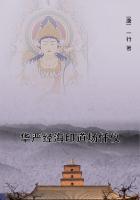Therefore let us honour the grammarian in his place; and, among others, these old grammarians of Alexandria; only being sure that as soon as any man begins, as they did, displaying himself peacock-fashion, boasting of his science as the great pursuit of humanity, and insulting his fellow-craftsmen, he becomes, ipso facto, unable to discover any more truth for us, having put on a habit of mind to which induction is impossible; and is thenceforth to be passed by with a kindly but a pitying smile. And so, indeed, it happened with these quarrelsome Alexandrian grammarians, as it did with the Casaubons and Scaligers and Daciers of the last two centuries. As soon as they began quarrelling they lost the power of discovering. The want of the inductive faculty in their attempts at philology is utterly ludicrous. Most of their derivations of words are about on a par with Jacob Bohmen's etymology of sulphur, wherein he makes sul, if I recollect right, signify some active principle of combustion, and phur the passive one. It was left for more patient and less noisy men, like Grimm, Bopp, and Buttmann, to found a science of philology, to discover for us those great laws which connect modern philology with history, ethnology, physiology, and with the very deepest questions of theology itself. And in the meanwhile, these Alexandrians'
worthless criticism has been utterly swept away; while their real work, their accurate editions of the classics, remain to us as a precious heritage. So it is throughout history: nothing dies which is worthy to live. The wheat is surely gathered into the garner, the chaff is burnt up by that eternal fire which, happily for this universe, cannot be quenched by any art of man, but goes on forever, devouring without indulgence all the folly and the falsehood of the world.
As yet you have heard nothing of the metaphysical schools of Alexandria;for as yet none have existed, in the modern acceptation of that word.
Indeed, I am not sure that I must not tell you frankly, that none ever existed at all in Alexandria, in that same modern acceptation. Ritter, I think, it is who complains naively enough, that the Alexandrian Neoplatonists had a bad habit, which grew on them more and more as the years rolled on, of mixing up philosophy with theology, and so defiling, or at all events colouring, its pure transparency. There is no denying the imputation, as I shall show at greater length in my next Lecture.
But one would have thought, looking back through history, that the Alexandrians were not the only philosophers guilty of this shameful act of syncretism. Plato, one would have thought, was as great a sinner as they. So were the Hindoos. In spite of all their logical and metaphysical acuteness, they were, you will find, unable to get rid of the notion that theological inquiries concerning Brahma, Atma, Creeshna, were indissolubly mixed up with that same logic and metaphysic. The Parsees could not separate questions about Ahriman and Ormuzd from Kant's three great philosophic problems: What is Man?--What may be known?--What should be done? Neither, indeed, could the earlier Greek sages. Not one of them, of any school whatsoever--from the semi-mythic Seven Sages to Plato and Aristotle--but finds it necessary to consider not in passing, but as the great object of research, questions concerning the gods:- whether they are real or not; one or many;personal or impersonal; cosmic, and parts of the universe, or organisers and rulers of it; in relation to man, or without relation to him. Even in those who flatly deny the existence of the gods, even in Lucretius himself, these questions have to be considered, before the question, What is man? can get any solution at all. On the answer given to them is found to depend intimately the answer to the question, What is the immaterial part of man? Is it a part of nature, or of something above nature? Has he an immaterial part at all?--in one word, Is a human metaphysic possible at all? So it was with the Greek philosophers of old, even, as Asclepius and Ammonius say, with Aristotle himself. "The object of Aristotle's metaphysic," one of them says, "is theological.
Herein Aristotle theologises." And there is no denying the assertion.
We must not then be hard on the Neoplatonists, as if they were the first to mix things separate from the foundation of the world. I do not say that theology and metaphysic are separate studies. That is to be ascertained only by seeing some one separate them. And when I see them separated, I shall believe them separable. Only the separation must not be produced by the simple expedient of denying the existence of either one of them, or at least of ignoring the existence of one steadily during the study of the other. If they can be parted without injury to each other, let them be parted; and till then let us suspend hard judgments on the Alexandrian school of metaphysic, and also on the schools of that curious people the Jews, who had at this period a steadily increasing influence on the thought, as well as on the commercial prosperity, of Alexandria.
You must not suppose, in the meanwhile, that the philosophers whom the Ptolemies collected (as they would have any other marketable article) by liberal offers of pay and patronage, were such men as the old Seven Sages of Greece, or as Socrates, Plato, and Aristotle. In these three last indeed, Greek thought reached not merely its greatest height, but the edge of a precipice, down which it rolled headlong after their decease. The intellectual defects of the Greek mind, of which I have already spoken, were doubtless one great cause of this decay: but, to my mind, moral causes had still more to do with it. The more cultivated Greek states, to judge from the writings of Plato, had not been an over-righteous people during the generation in which he lived. And in the generations which followed, they became an altogether wicked people;immoral, unbelieving, hating good, and delighting in all which was evil.













